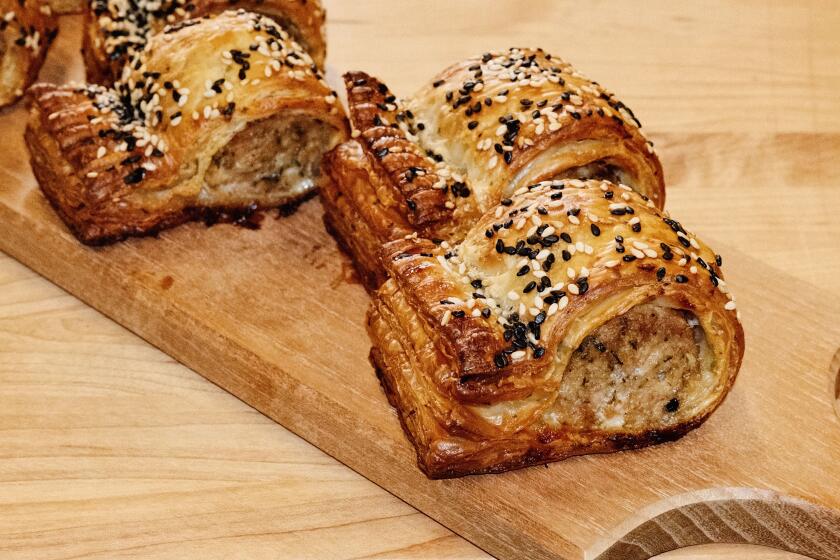Celebrating Dia de los Muertos with candied pumpkin tamales

Chefs and restaurateurs Ramiro Arvizu and Jaime Martin Del Campo of “La Casita Mexicana” and “Mexicano”, share their stories on how they celebrate Dia de Los Muertos (Day of the Dead).
It’s as if the essence of fall has somehow been harnessed by the pot bubbling away on the stove. In the atmosphere of the kitchen: bright notes of cinnamon and clove, and the deep molasses of piloncillo, the unrefined Mexican sugar shaped like tiny traffic cones. Then the earthy aroma of pumpkin kicks in from what’s in the pot: wedges of the brightly colored squash simmered to tenderness, the fragrant liquid around it now a caramel-like glaze.
Chefs Jaime Martín del Campo and Ramiro Arvizu are in the kitchen of their newest restaurant, Mexicano, demonstrating calabaza en tacha — candied pumpkin. The popular duo, who opened their lauded restaurant, La Casita Mexicana, in Bell in 1999 and make frequent appearances on Spanish- and English-language television, are considered by many the unofficial ambassadors of Mexican cuisine. And this year they expanded their cooking empire with two more restaurants, both in the Baldwin Hills Crenshaw Plaza: Flautas, a quick-order food stall; and Mexicano, it’s larger, sit-down formal sibling.
Recipes: Candied pumpkin | Pumpkin tamales
The candied pumpkin the chefs are preparing is for the popular Mexican holiday Día de los Muertos (Day of the Dead). When the pumpkin is ready, the pair use it to make a batch of sweet tamales — though it can be added to a variety of dishes, both sweet and savory, or simply enjoyed on its own.
“Día de los Muertos is a celebration — a beautiful Mexican tradition,” Arvizu says. “It’s a celebration of the loved ones that have left this Earth. Food is very important.”
“Talking, listening to music, eating and sharing food,” adds Del Campo. “It’s a way of hiding your sadness. Celebrating them alleviates this. You keep them alive as long as you celebrate the memory of them.
“This year, it has a different meaning for me. This year, it’s dedicated to my father.”
Del Campo smiles; his father died just a few months ago, and the candied pumpkin carries special meaning. Growing up, his father owned a small farm in Tototlan in the state of Jalisco, Mexico. “It was his life,” Del Campo says. “He wasn’t very good. He harvested watermelons and pumpkins.” As a young boy, Del Campo hated farming; as close as they were, he didn’t understand his father’s love of working the land.
“He would come into the house with one of his pumpkins and say, ‘Look at this pumpkin! It’s the largest there is! Mine is best! Look at the love!’ I thought he was crazy.”
Del Campo preferred city life, and, with Arvizu, turned his passion for cooking into a profession. Around the time Mexicano opened, Del Campo’s father fell ill, and the pair brought him to the States. “I was his adopted son,” Arvizu says before Del Campo interrupts. “You both loved tequila. He used to enjoy life — the food, the music, the tequila.”
SIGN UP for the free In the Kitchen newsletter >>
The pair gave Del Campo’s father a private tour of Mexicano. The formal dining room features high plaster ceilings with dark wood accents and furniture, a striking blue tile pattern spanning the floor. The white plaster walls feature colorful portraits of produce, including Del Campo’s father’s beloved squash and watermelons, and the massive hand-painted mural behind the bar is a homage to historic Mexican figures. (If you look closely, you can spot the small figures of Del Campo and Arvizu off to one side.)
“He was so proud,” del Campo recalls. “We shared a shot of tequila at the bar.”
For Del Campo, this year’s Día de los Muertos will include tequila as well as the candied pumpkin in memory of his father. “I want to celebrate him with what he loved to eat and drink.”
Del Campo has also bought his father’s farm, ensuring that it stays in the family. As he scrolls through pictures of the land and its produce on his phone, he talks about plans for expansion and how he can’t wait to visit. He talks with an excitement reminiscent of his father.
“I never wanted to farm,” Del Campo says, again smiling. “But life has a way of taking me back to my roots.”
::
Candied pumpkin can be a sweet addition to stews, salads, even a glass of milk
Candied pumpkin, or calabaza en tacha, is wonderful eaten on its own, though it also works well in a variety of dishes, both sweet and savory. Dice the pumpkin and sauté it lightly with vegetables to use as a filling in omelets or as an added flavoring in stews. Mash or dice the pumpkin to add to pancake batter or as a filling for empanadas. You can also use the candied pumpkin to add sweet notes to salads or as a topping for ice cream. It also works in drinks: Mash a little and mix it with a glass of milk for a sweet snack or even a light meal.
Twitter: @noellecarter
ALSO:
Halloween for adults: Saucy pumpkin cocktail
Check out the thousands of recipes on our Recipe Database
Halloween and Día de los Muertos food and drink specials around town
More to Read
Eat your way across L.A.
Get our weekly Tasting Notes newsletter for reviews, news and more.
You may occasionally receive promotional content from the Los Angeles Times.








